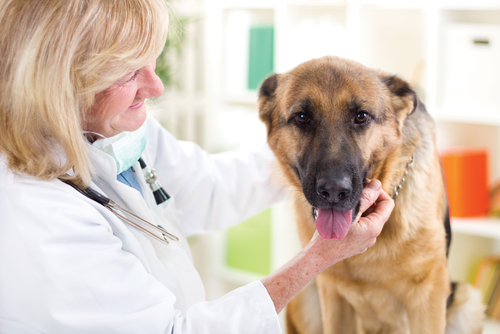Plant-based diets are getting increasing attention in the media as more Americans decide to reduce or eliminate consumption of meat. Although vegetarianism has remained at a fairly constant 5-8% of all Americans, meat production has decreased by 400 million animals from 2007 to 2015. Documentaries like What the Health have inspired people to go vegan, avoiding foods from animal sources all together for a number of reasons, including environmental impact, animal welfare, overall health, and weight loss or maintenance.

The trend has spilled over into the pet food industry with a number of commercial brands selling vegetarian formulations of wet and dry food for dogs. Many people are choosing to feed their dogs a homemade vegetarian diet and social media reactions to those choosing to share this choice have been mixed and controversial.
One such pup parent was vilified by commenters when she posted a photo of her dog posed near a homemade sweet potato casserole, prepared as a dinner for the dog and her vegan parent. People are passionate about their food choices and this intensity is in full bloom when discussing the merits of feeding our canine companions a diet sans meat.

Are Dogs Carnivores, Omnivores, or Something Else?
It seems like a relatively easy question, right? A horse is an herbivore. A lion is a carnivore. Humans are omnivores. Dogs? It gets a little blurry. Biologically speaking, the signs seem to point to carnivore. In practice, however, dogs have been eating an omnivorous diet since domestication.
The often cited example for the potential of a meat-free canine diet is Bramble, a Border Collie who was fed a vegan diet and lived to be over 25 years old. As amazing as that is, is it clear evidence of the merits of meat-free foods for dogs or just one lucky pup?
The Biological Arguments
Food digestion starts in the mouth. In looking at teeth, it is clear that a dog’s teeth are designed to eat meat. They are sharp and strong, easily tearing meat and crunching bones to get to the marrow. They lack broad molars that grind down food. Instead, food is swallowed in large chunks to be further digested in the stomach.

Humans and other mammals produce an enzyme called amylase in saliva that serves to pre-digest carbohydrates, such as grains. Dogs do not produce this enzyme in the mouth, which is an oft cited argument from proponents of an all-meat diet for dogs. However, dogs do secrete amylase from the pancreas, allowing carbohydrates to get broken down and used in a canine’s gut, a fact that is pointed out by producers of vegetarian dog food products.
When looking at a dog’s digestive tract, the size is commonly pointed to as biological evidence for being carnivorous. Compared to undisputed herbivores, who have long digestive tracts to break down slowly to digest plant matter, the digestive tract of a dog is short. Meat is processed relatively quickly, so it requires only a short digestive tract to be fully broken down.

In addition to size, the ability to ferment plant matter, and therefore use that material as energy, is high in the intestines of herbivores and relatively low in dogs. Also, dogs require two amino acids that are not found in plant-based sources. Although supplementation can overcome this, it has to be done so very carefully to ensure a dog does not develop serious health conditions as a result of deficiencies.
One Expert’s Opinion
Homeopath and vegetarian Julie Anne Lee, DCH RCSHom gave a talk titled “Nutritional, Energetic and Ethical Value Of The Vegetarian Versus the Carnivore Dog” at last year’s Raw Roundup, an annual online event bringing together people who share the common goal of “creating good health with appropriate nutrition for your dog.”

As a vegetarian and long time advocate for more ethical standards in animal farming, Lee very much wanted to find that going veg was a sound choice for canines. After doing massive amounts of research in preparation for the talk, she concluded, “Sadly for me there is simply NOT enough evidence to support vegetarianism for dogs.”
Proceed with Caution
Expert opinion aside, there are plenty of success stories to be found with dogs who have eaten plant-based diets due to medical necessity or due to the choice of their caretaker. A woman in Adelaide, Australia has been feeding her two Golden’s a vegan diet for nearly their entire lives and at 10 and 8 years old, they are the picture of health. She is very careful about meal planning and supplementation and the dogs received regular medical exams, including frequent blood work, in order to ensure they were not experiencing any nutritional deficiencies.

Although designed as carnivores and typically fed as omnivores, dogs can become vegetarian with careful supplementation, meal planning, and frequent medical check ups. Whether or not they should, though seems to be a matter of opinion. In the end, you have to decide what’s right for you and your furry friend.
 Toledo, United States.
Toledo, United States.